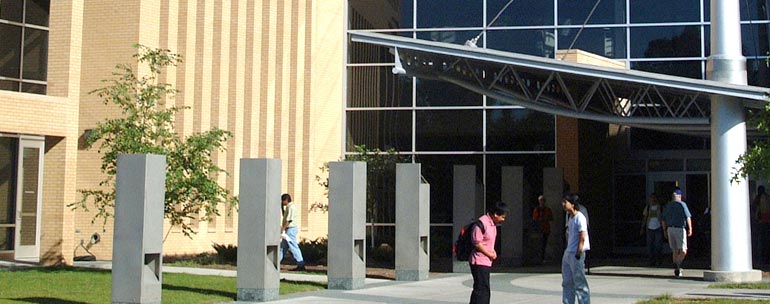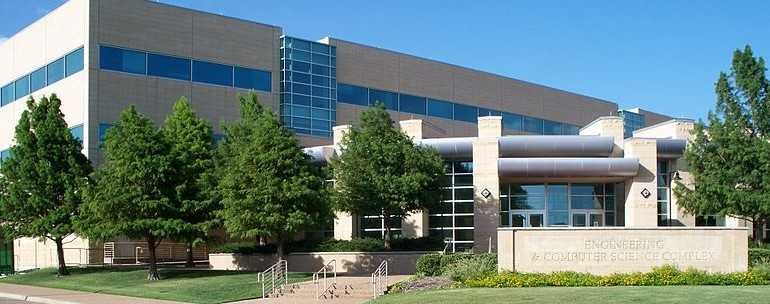Some of the best computer engineering schools offer both on-campus and online learning options.

A bachelors in computer engineering can help you develop the necessary engineering and computer skills to enter this lucrative field.
Editorial Listing ShortCode:
In this article, not only will we discuss what you might learn in a computer engineering program, but we’ll also cover some tips for choosing the best school for your professional goals and interests.
Computer Engineering Degrees

Computers and embedded computer processors and controls are being used more and more.
There are many specialized skills computer engineers can learn and use in interesting and challenging jobs. For instance, they can develop new automation systems for medical devices, planes, automobiles, robotics, and machine learning.
Editorial Listing ShortCode:
Computer engineering degree programs are technically rigorous, incorporating topics such as:
- Advanced math concepts
- Electrical and electronics engineering principles and concepts
- Computer hardware systems and components
- Computer hardware design and testing methods
- Hardware and software interfaces
A bachelor’s degree can also be paired with a specialization. Computer engineers tend to earn above average salaries, and they can perform interesting, challenging work that contributes to new innovations.
How to Choose a Computer Engineering Program

With so many computer engineering programs out there, it’s helpful to stop and consider how you might identify the best schools in this field as well as the best programs for your personal learning goals and interests.
Here are some factors to consider when you’re trying to decide which school is right for you:
- Accreditation. It’s beneficial to attend a school that is regionally accredited. You may also want to consider looking for curriculum programs that are accredited by an independent, computer-engineering-focused accrediting body. This can help you ensure you’re learning the skills applicable to the current industry.
- Course programs and offerings. Curriculum designs at some universities may be a better match for your interests and learning goals. You can compare and size up the scope and rigor of course offerings at different schools.
- Experienced faculty. If you’re aiming for a bachelor’s in computer engineering, you may want to consider attending a school where the professors also teach some graduate-level classes in the field.
- Academic support services. Some schools may offer better academic support services. They may help you earn professional certifications or have campus programs designed to connect their computer engineering graduates to jobs after graduation.
- School recommendations. You can identify some big employers in the field and ask their HR specialists what schools they recommend.
In the end, doing some research and asking some pointed questions about programs can help you determine which school is really the best choice for you.
Computer Engineering Careers and Salaries

With the right education, training, specialization, experience, and certification, you could find rewarding career opportunities in the computer engineering field.
Some professionals in the field specialize in computer hardware design and manufacturing. Others may pursue careers working with computer operating systems or developing application software, such as office software tools and applications.
According to the Bureau of Labor Statistics, careers in the computer engineering field can represent various branches of specialization and tend to pay above average salaries.
| Careers | Annual Median Salaries |
| Architectural and Engineering Managers | $149,530 |
| Computer Hardware Engineers, Computer and Peripheral Equipment Manufacturing | $146,640 |
| Computer Hardware Engineers, Research and Development | $133,060 |
| Computer Hardware Engineers, Federal Government | $118,620 |
| Computer Network Architects | $116,780 |
| Computer Hardware Engineers, Electronic Component Manufacturing | $115,140 |
| Software Developers | $110,140 |
| Sales Engineers | $108,830 |
| Information Security Analysts | $103,590 |
| Computer Programmers | $89,190 |
These career pathways can require technical training, and some professionals will pursue technical certifications as well.
Computer engineers might also work in tandem with electrical engineers in any number of industries. Computer circuitry, digital communications networks, database systems, cloud computing, and artificial intelligence are taking on new applications in various sectors.
Editorial Listing ShortCode:
Some experienced computer engineers may find that they like working on sales and customer support teams as technically qualified sales engineers.
Bachelor’s in Computer Engineering Curriculum

Computer engineering involves advanced math, electrical engineering concepts, and topics in computer programming, computer architecture, and communication technologies. Courses offered will vary by program and areas of specialization, but some example courses include:
- Computer Engineering Methods: You’ll learn about mathematical principles and formulas used in engineering designs.
- Electromechanical Systems: This course examines design, testing, and analysis methods for electromechanical systems.
- Signals and Systems: This course is an introduction to analog and digital signal processing and basic concepts for continuous-time and discrete-time signals.
- Embedded Systems: You’ll learn about microprocessors and microcontrollers and their functions in embedded systems.
- Electronic Materials and Devices: You’ll learn fundamental principles related to embedded electronic circuitry designs and device properties, you’ll also learn concepts related to transistors, polarity, and voltage.
- Communication Systems: This course covers methods and concepts related to electrical engineering systems and designs for networked communication systems.
- Algorithms: You’ll learn about algorithms, algorithmic functions, analysis, and design.
- Operating Systems: This course is an overview of operating system architecture and design principles and methods.
- Software Engineering: You’ll learn about fundamental software design principles and best practices for software development processes.
- Cloud Computing: You’ll learn methods and principles for designing, configuring, and managing cloud computing networks.
These courses provide just a sampling of the types of technical courses and topics that make up computer engineering degree programs.
Admissions Requirements

Computer engineering degree programs typically require students to enroll in physical science and advanced math courses. So, admissions requirements at colleges for computer engineers may include math and science prerequisites.
Admissions requirements can vary, but they generally include the following:
- High school diploma or equivalent
- Satisfactory GPA
- SAT or ACT scores (only some schools require them)
- Any specified prerequisites in math or science
Whatever your qualifications may be, pursuing a bachelors in computer engineering will involve advanced mathematical concepts and training in technical and analytic principles and methods.
Accreditation

Whether you plan to attend college in person or take online courses, schools that have regional accreditation have proven to meet satisfactory standards for academic quality and student services.
Regional accreditation signifies that you’ll receive high quality instruction as well as access to qualified faculty and academic resources. Accreditation can also be a precondition for credit transferability and some forms of financial aid.
Editorial Listing ShortCode:
The Council For Higher Education Accreditation (CHEA) can help you learn more about accreditation and finding accredited schools.
Financial Aid and Scholarships

If you’re looking to choose from among the best computer engineering colleges, you might find that receiving the best training also comes with higher tuition costs.
If you need help covering your education expenses, financial aid can be a good option for students who qualify. You may be able to pay less tuition and still stick with top schools if you can qualify for in-state tuition at a well-regarded state university.
Common forms of need-based aid include state aid and federal aid, employer-based tuition assistance programs, scholarships, work study programs, and student loans. Terms for loans and other offers can vary, so it’s beneficial to review all offers carefully.
If you plan to apply for need-based assistance, you can start by filling out the Free Application for Federal Student Aid (FAFSA).
How Hard Is Computer Engineering?

Computer engineering utilizes technical knowledge, terminology, concepts, and principles. Computer engineers also learn to apply advanced math to their work.
Professionals in this field also have to think very analytically and consider how various engineering and math principles may impact computer systems, components, and designs.
In both learning and work settings, analysis, testing, and troubleshooting skills and methods can also be required. Some people may find it difficult to apply various concepts and methods to detect and solve technical problems, while others may enjoy the challenge.
What Can You Do with a Bachelors in Computer Engineering?

Professionals with technical computer engineering skills might pursue roles with computer hardware developers and manufacturing firms.
Qualified computer hardware engineers are not only needed for computer manufacturing research and development. They are also needed for research and development work in computer-assisted equipment used in other sectors. This can involve equipment used in automobiles, planes, advanced communications, and robotics.
Editorial Listing ShortCode:
Professionals in this field can also test and upgrade existing computer equipment components. As new technologies emerge, computer engineers might also help design and develop emerging computer and communication hardware and electronic systems.
They may also develop computerized interfaces and controls for more complex automated systems or industrial products.
What’s the Difference Between a Computer Science vs. Computer Engineering Degree?

When comparing computer engineering vs. computer science, you should note that computer engineering intersects more with electrical and electronics engineering principles. It involves more hardware and software design, development, and manufacturing activity.
However, computer science is geared more toward equipping professionals to maintain and troubleshoot computer networks and help manage, set up, and integrate operating and software programs.
| Computer Engineering | Computer Science |
|
|
What’s the Difference Between a Computer Engineering vs. Software Engineering Degree?
Computer engineers often need to know about software engineering. They may design computers or related digital devices that need to operate or interface effectively with software. Software engineers focus more on developing software systems and applications.
| Computer Engineers | Software Engineers |
|
|
Is Computer Engineering Worth It?

Yes, computer engineering is worth it for many professionals. Computer engineering involves complex engineering skills and principles. Qualified computer engineers might work in any number of roles related to the design, improvement, or testing of computer operating systems or computer software applications.
Career opportunities for computer engineers can present themselves across a range of industries. For instance, computers, integrated communications and data networks, and computer automation have become intertwined with innovations in the automobile, clean energy, robotics, and avionics sectors.
Editorial Listing ShortCode:
The Bureau of Labor Statistics predicts 3% job growth for architecture and engineering occupations and 11% job growth for computer and information technology jobs over the next ten years.
Universities Offering Bachelors in Computer Engineering Degree Programs
Methodology: The following school list is in alphabetical order. To be included, a college or university must be regionally accredited and offer degree programs online, campus, or in a hybrid format.

Boston University offers a Bachelor of Science in Computer Engineering. To graduate, students must complete 133 credits, including a senior project. The program can typically be completed in 4 years on campus. Applicants must submit 2 essays and official high school transcripts along with an application stating their school of choice.
Boston University is accredited by the New England Commission of Higher Education.

Colorado Technical University offers a Bachelor of Science in Computer Engineering. The program requires students to complete 190.5 credits on the Colorado Spring campus to graduate.
Those interested in the program must connect with an admissions advisor before beginning the application process. Proof of high school graduation or the equivalent must be submitted.
Colorado Technical University is accredited by the Higher Learning Commission.

DeVry University offers a Bachelor of Science in Engineering Technology with a specialization in Computers. The program is offered completely online and can typically be completed in 3 years. To graduate, students must obtain 139 credit hours. Those interested in the program must complete an interview with an admissions advisor.
DeVry University is accredited by The Higher Learning Commission.

Embry-Riddle Aeronautical University offers a Bachelor of Science in Computer Engineering. Students must choose between one of two campuses for their studies and complete 127 credits to graduate. Applicants must complete an online application and submit official high school transcripts and ACT or SAT scores.
Embry-Riddle is accredited by the Southern Association of Colleges and Schools Commission on Colleges.

The Florida Institute of Technology offers a Bachelor of Science in Computer Engineering. The program offers students a chance to take part in a 10 week, summer research experience and a senior project and to aid seniors on their projects.
Applicants must submit high school transcripts and SAT or ACT scores. Applicants may also submit an essay and letters of recommendation to bolster their application.
Florida Institute of Technology is accredited by the Southern Association of Colleges and Schools Commission on Colleges.

Florida International University offers an online Bachelor of Science in Computer Engineering program. To graduate, students must complete 128 credits, with at least 9 credits in one of the two elective concentration areas. Applicants must submit SAT or ACT scores and high school transcripts when applying.
Florida International University is accredited by the Southern Association of Colleges and Schools Commission on Colleges.

Liberty University offers a Bachelor of Science in Computer Engineering. To graduate, students must complete 135 credit hours while maintaining a GPA of 2.0 or higher. To be eligible for the program, applicants must have a high school GPA of 3.15 or higher and submit SAT or ACT scores and an essay.
Liberty University is accredited by the Southern Association of Colleges and Schools Commission on Colleges.

Morgan State University offers a Bachelor of Science in Electrical and Computer Engineering. The program requires 120 credit hours to graduate and typically takes 4 years to complete. Applicants must submit official high school transcripts. They may also submit their SAT and ACT scores and a 500 word essay.
Morgan State University is accredited by the Middle States Commission on Higher Education.

National University offers a Bachelor of Science in Electrical and Computer Engineering. The program can be completed online or on campus and both options offer 4 week courses.
To be eligible, applicants must have a GPA of 2.0 or higher. Applicants who haven’t gone to college before must take the WES Training and Development orientation course.
National University is accredited by the WASC Senior College and University Commission.

New York University offers a Bachelor of Science in Computer Engineering. To graduate, students must complete 128 credits with a grade of 2.0 or higher, a senior design project, and a final thesis. Applicants must submit ACT or SAT scores and transcripts from other colleges attended.
New York University is accredited by the Middle States Commission on Higher Education.

Old Dominion University offers a Bachelor of Science in Computer Engineering Technology. The program, which is designed for those who have already begun their studies in the field, can be completed online and requires 128 credits to graduate. Those interested in the program must submit an online application.
Old Dominion University is accredited by the Southern Association of Colleges and Schools Commission on Colleges.

Portland State University offers a Bachelor of Science in Computer Engineering. The program requires 183 credits to graduate and can typically be completed in 4 years. Those interested in the program must have a GPA of 2.5 or higher. Applicants who don’t meet the GPA requirements may still be admitted based on other factors.
Portland State University is accredited by the Northwest Commission on Colleges and Universities.

Regent University offers a Bachelor of Science in Computer Engineering. To graduate, students must complete 126 credits, including an engineering capstone project. The program is offered completely online. Those interested in this online computer engineering degree program must submit transcripts, an admission questionnaire, and government-Issued ID with their application.
Regent University is accredited by the Southern Association of Colleges and Schools Commission on Colleges.

St. Cloud State University offers a Bachelor of Science in Computer Engineering. The program requires students to complete 106 credit hours, with 72 core credits and a final capstone project. Those interested in the program must have a GPA of 2.5 or higher and complete 11 prerequisite courses.
Cloud State University is accredited by the Higher Learning Commission.

The University of Arizona offers an online program for a Bachelor of Science in Electrical and Computer Engineering. It requires students to complete 128 credits to graduate and can usually be completed in 4 years. Those interested in the program must apply to the school under the “Engineering, No Major” option.
The University of Arizona is accredited by the Higher Learning Commission.

The University of Houston offers a Bachelor of Science in Computer Engineering Technology.
To graduate, students must complete 124 semester hours while maintaining a GPA of 2.0 or higher. The final 30 semester hours must be taken on campus. Those interested in the program may either submit ACT or SAT scores or a resume and an admissions essay to the school.
The University of Houston is accredited by the Southern Association of Colleges and Schools Commission on Colleges.

The University of South Carolina offers a Bachelor of Science in Engineering with a specialization in Computer Engineering.
The program requires students to complete a capstone project in both software engineering and computer engineering. Applicants must submit an admission essay, a list of extracurricular activities, a school report form, and high school transcripts.
The University of South Carolina is accredited by the Southern Association of Colleges and Schools Commission on Colleges.

The University of Texas—Dallas offers a Bachelor of Science in Computer Engineering. The program requires students to complete 126 credit hours and can typically be completed in 4 years.
Those interested in the program must submit a resume and their high school rank and GPA. They may also submit SAT and ACT scores, an admission essay, and letters of recommendation to bolster their application.
The University of Texas at Dallas is accredited by the Southern Association of Colleges and Schools Commission on Colleges.

The University of the Virgin Islands offers a Bachelor of Science in Computer Engineering Technology.
The program is offered completely online and requires 120 credit hours to graduate. Those interested in the program must complete an online application and submit either a high school transcript or college transcripts if they wish to transfer credits into the program.
UVI is accredited by the Commission on Higher Education of the Middle States Association of Colleges and Schools.

The University of Washington offers a Bachelor of Science in Computer Engineering. To graduate, students must complete 180 credits, including a Design Capstone Project. A grade of 2.0 or higher is required for any math, science, or computer engineering courses. Applicants must submit an online application.
The University of Washington is accredited by the Northwest Commission on Colleges and Universities.
Finding the Best Computer Engineering Schools Online

If you enjoy engineering and hardware challenges, getting a bachelors in computer engineering can help you prepare for this highly technical field.
You can also find computer engineering degree programs online. Online programs from accredited schools are credible and tend to offer flexible scheduling. This may allow you to earn your degree at to your own pace.
You can check out accredited colleges to discover what the best computer engineering schools have to offer and to see which curriculum designs best fit your professional goals and interests.

